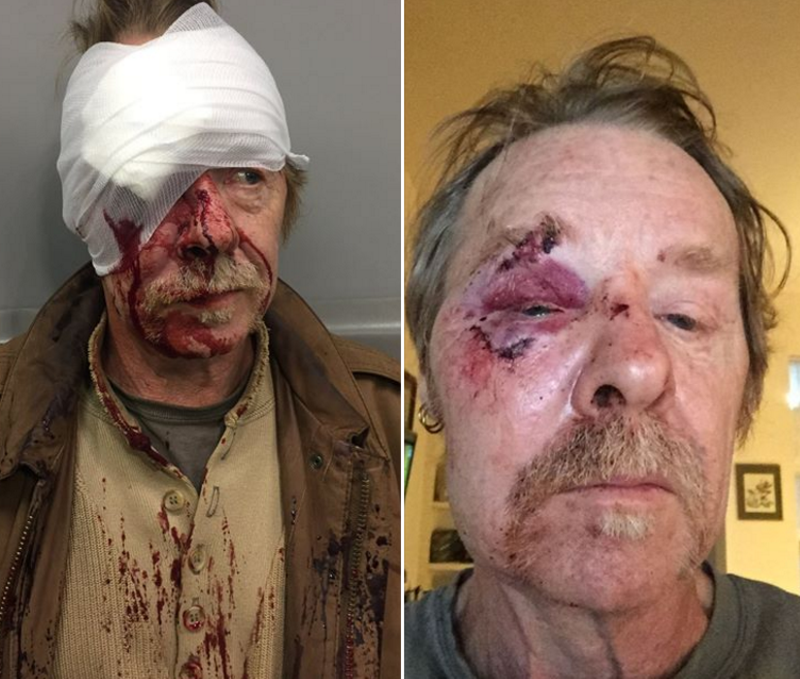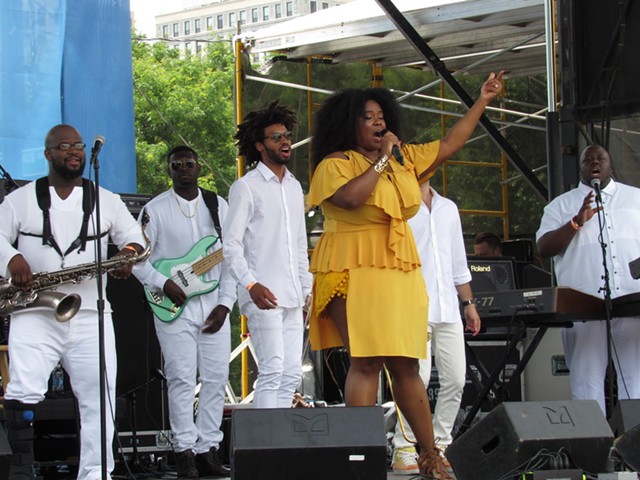St. Louis Musician Attacked in "Knockout Game" Assault Says He's "Not Angry at Them"
[
{
"name": "GPT - Leaderboard - Inline - Content",
"component": "41932919",
"insertPoint": "5th",
"startingPoint": "3",
"requiredCountToDisplay": "3",
"maxInsertions": 100
}
]
Daily, Tom Hall walks an exact mile from his apartment in Soulard to Aboussie Park, “the smallest park in the world,” where he sits for a few minutes and reflects on the afternoon. He often stacks on extra mileage by looping around these deeply familiar blocks, sometimes stopping off at a local bar. Places like Nadine’s, where he paused for a round last Thursday night.
Trying “to get home in time for the Blues game,” Hall remembers making a couple decisions around 7:30 p.m. that would have major consequences. Hoofing it down Menard, roughly between Duke’s and Great Grizzly Bear, the musician saw a group of five men walking on the opposite side of the street. Assuming wrongly that “they were just bar hoppers” he cut through a wide, open alleyway for the final steps home, which, he says, “was my second mistake.”
Walking quickly, but never running, the group drew even with Hall. Four of the young men fanned around, then past him. As they did, they requested a cigarette, then a lighter — and suddenly Hall realized that something was amiss. He turned on his heels to walk the other direction, back to the safety of the busier Menard. The last member of the group, though, “a really big guy,” was behind him as he spun. Without warning, Hall’s assailant struck with a single, direct shot to Hall’s right eye.
Never seeing the punch coming, Hall crumpled to the ground in sudden, extreme pain — but very much conscious. With the other four silently watching, Hall’s attacker began kicking him. One round of heavy-footed kicks. A pause. Another round. Another pause. As blood poured from his eye, mouth and broken nose, Hall braced for a third series of kicks. Through the shock and confusion, though, he saw a neighbor walking his dogs. Then a second neighbor appeared. He called out for help and the attack stopped.
The group, as one, began “moseying on down the alleyway,” Hall says. Though dazed and confused, he recalls them “joking and laughing” as they calmly moved away. At no point did they ask for his money, phone or wallet, suggesting that the twenty-second incident was a mimic of “the knockout game,” a violent series of copycat attacks that have ebbed and flowed in south city neighborhoods over the past decade.
More philosophical than some would be under such circumstances, Hall figures that the attack was part of our zeitgeist — a violent, micro-expression of worldwide power dynamics.
“They’re directing their anger at the wrong place,” Hall says, of these young men and countless others. “They’re young. They want to feel power and impress their friends. That’s why they do it. It’s an indictment of our society, as far as I’m concerned. The rich have power; those that don’t try to get some, even in a small, stupid way like this. I was at the wrong place at the wrong time and [wound up in] a really random act of violence.”
Hall wonders “what they’re thinking when they’ve done something like that. I wonder if they enjoy that, that release of anger. And I wonder about when they’re 55 or 60, if they’ll think back on this and why they did it. I’ve had friends say that they’ll be dead or in jail by then, and I guess there’s some truth in that, but … I don’t want that.”
That the attack happened on Hall’s longtime home turf adds a certain extra sting to the situation.
He recalls moving to the area “back in ‘80 or ‘81. It was mostly shells then. It was kinda like the wild west in a way, you could do anything you wanted.” At that time, the district was both working-class and bohemian, just a couple decades removed from the wrecking balls that preceded the construction of I-44 and I-55, which ripped through the neighborhood. Years removed from gentrification, the area was home to straight-up characters — and blues musicians were common among that number.
Finding a sense of home in Soulard, Hall was becoming a well-known guitarist with groups such as River City Rhythm and the Geyer Street Sheiks; along with band work, he gigged prolifically as a solo performer. Over time, he’d host a show on KDHX and perform in a series of duos, most recently in a generation-spanning act with hotshot pianist Ethan Leinwand. Ever-deepening his renowned abilities to play the blues (and American roots music, generally), Hall’s been an active, musical presence of the barrooms of Soulard ever since arriving.
“I’ve seen Soulard change from nothing to this business that it is now,” he says.
In the hours after the attack, Hall posted to Facebook, including photos that graphically showed the damage done. Dozens of calls, voice messages and texts followed and Hall turned off his phone, deeply feeling the need for immediate solace in music.
Less than 24 hours after the event, and still wracked by violent spasms of facial pain, Hall found himself at what he refers to as one of his “wallpaper gigs.” Every Friday at Lafayette Square’s Sqwires, Hall plugs in and plays a happy-hour set while diners enjoy an early meal or after-work drink. Though a couple of friends showed up for this weekly gig, Hall was able to work through the stress and shock while mostly alone, in public.
“I’m glad I did that,” Hall says of the short set. “I had to get back on the horse.”
Post-script: After talking about the incident at-length for this piece, Hall wrote back, via text: “there’s one more thing I want to say.” Reached by phone, he noted, “I just want to say to them that I’m not angry.”
“Them.” The readers of the piece? The attackers, maybe? Who?
“I want them to know,” he said, plainly enough, “that I’m not angry at them. I’m not.”
Friends of the artist have started a GoFundMe page to help defray the cost of his injuries. Donate here.






